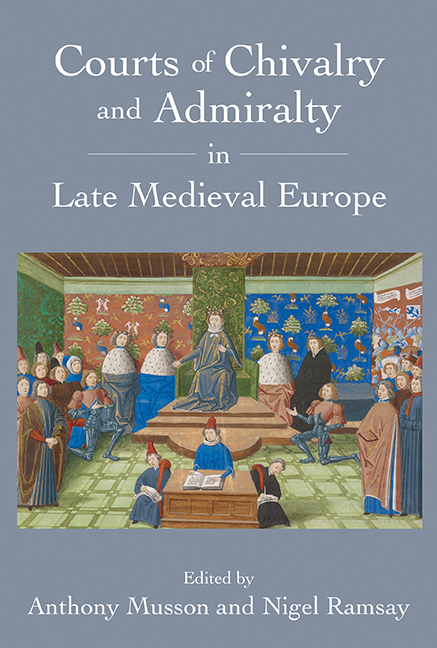Book contents
- Frontmatter
- Contents
- List of Illustrations
- Notes on Contributors
- Preface
- A Note on Editorial Practice
- List of Abbreviations
- Introduction
- Chapter 1 Heralds and the Court of Chivalry: From Collective Memory to Formal Institutions
- Chapter 2 French Armorial Disputes and Controls
- Chapter 3 Art, Objects and Ideas in the Records of the Medieval Court of Chivalry
- Chapter 4 Sir Robert Grosvenor and the Scrope–Grosvenor Controversy
- Chapter 5 From Brittany to the Black Sea: Nicholas Sabraham and English Military Experience in the Fourteenth Century
- Chapter 6 ‘Armed and redy to come to the felde’: Arming for the Judicial Duel in Fifteenth-Century England
- Chapter 7 The Jurisdiction of the Constable and Marshals of France in the Later Middle Ages
- Chapter 8 The Origins and Jurisdiction of the English Court of Admiralty in the Fourteenth Century
- Chapter 9 The Consulate of the Sea and its Fortunes in Late Medieval Mediterranean Countries
- Chapter 10 The Admiralty and Constableship of England in the Later Fifteenth Century: The Operation and Development of these Offices, 1462–85, under Richard, Duke of Gloucester and King of England
- Chapter 11 Some Dubious Beliefs about Medieval Prize Law
- index
Chapter 8 - The Origins and Jurisdiction of the English Court of Admiralty in the Fourteenth Century
Published online by Cambridge University Press: 28 June 2018
- Frontmatter
- Contents
- List of Illustrations
- Notes on Contributors
- Preface
- A Note on Editorial Practice
- List of Abbreviations
- Introduction
- Chapter 1 Heralds and the Court of Chivalry: From Collective Memory to Formal Institutions
- Chapter 2 French Armorial Disputes and Controls
- Chapter 3 Art, Objects and Ideas in the Records of the Medieval Court of Chivalry
- Chapter 4 Sir Robert Grosvenor and the Scrope–Grosvenor Controversy
- Chapter 5 From Brittany to the Black Sea: Nicholas Sabraham and English Military Experience in the Fourteenth Century
- Chapter 6 ‘Armed and redy to come to the felde’: Arming for the Judicial Duel in Fifteenth-Century England
- Chapter 7 The Jurisdiction of the Constable and Marshals of France in the Later Middle Ages
- Chapter 8 The Origins and Jurisdiction of the English Court of Admiralty in the Fourteenth Century
- Chapter 9 The Consulate of the Sea and its Fortunes in Late Medieval Mediterranean Countries
- Chapter 10 The Admiralty and Constableship of England in the Later Fifteenth Century: The Operation and Development of these Offices, 1462–85, under Richard, Duke of Gloucester and King of England
- Chapter 11 Some Dubious Beliefs about Medieval Prize Law
- index
Summary
In the seminal article ‘The Sovereign and the Pirates, 1332’, published in 1970, Frederic Cheyette demonstrated how the adjudication of piracy disputes was essential to the formulation both of sovereignty and of the jurisdiction of the French and English admirals in the fourteenth century. Cheyette used as an illustrative example a court case from Agde, in 1332, where the king of France contested the right of the local lord, the bishop of Narbonne, to jurisdiction over some recently captured Genoese pirates. The bishop argued that justice over the coast in that area was his legal prerogative, but the French king countered that he had sovereignty over the waters of his kingdom and hence also to try piracy. This claim to sovereignty over the sea was a novel political manoeuvre, and it specifically entailed the ‘sovereign legitimation of the violence of war and sovereign limitation of the violence of justice’. The officer directed to exercise this sovereign right over the sea was the French admiral, yet before 1332 no French admiral ever exercised justice. Indeed, complaints over piracy normally went to ordinary royal officers, or to local lords or to Paris. This led Cheyette to conclude that the ‘office of admiral may […] be the rarest bird in the mediaeval administrative bestiary: one that was created in theory before it was instituted in practice’.
That conclusion is equally applicable for England in the fourteenth century. In 1875 Stubbs had remarked that
The history of the jurisdiction of these officers [admirals] is as yet obscure, both from the apocryphal character of all the early records of the Admiralty and from the nature of their authority, which was the result of a tacit compromise between the king as sovereign and lord of the sea, entitled to demand for office or defence the services of all his subjects, the privileged corporations of the sea-port towns with their peculiar customs and great local independence, and the private adventure of individuals, merchants, and mariners, whose proceedings seem to be scarcely one degree removed from piracy.
- Type
- Chapter
- Information
- Courts of Chivalry and Admiralty in Late Medieval Europe , pp. 157 - 178Publisher: Boydell & BrewerPrint publication year: 2018

